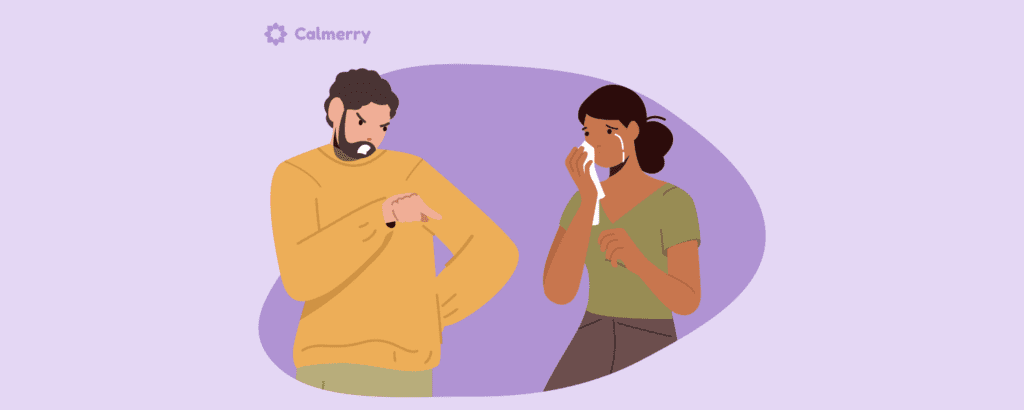7 Signs You Might Be in an Abusive Relationship

In this article
Abuse is not just a short-term argument between two people with insulting words exchanged. It’s a regular behavior pattern by one partner used to obtain total control and power over another one. It not only ruins the relationships but has serious negative consequences for a victim. It affects a person’s health and well-being and can be really devastating for their self-esteem, independence, and dignity.
The point is that some people cannot recognize abusive relationships. They don’t know what healthy ones look like. Perhaps it’s because they lived in a social environment where abuse was a common thing. Or, they are forced to think that it’s a normal aspect of relationships. But this is not the case — abuse is neither socially acceptable nor normal.
Usually, abusive behavior pattern appears in more than one form. Abuse can manifest in various ways and have different signs, so it’s often hard to recognize. Knowing the signs of abusive relationships helps to identify, avoid, or leave them safely for yourself.
Types of Abuse in Relationships
Considering physical violence as the only form of abuse is a misconception. Abusive relationships aren’t limited to it. They can include emotional, physical, sexual, and financial abuse. Each relationship is unique, so abusive relationships don’t look the same, but most of them have one common feature – the abusive partner uses different methods to gain control and power over the other partner.
In general, physical abuse is easily recognizable because it involves severe actions leading to tangible evidence of violence. In other words, it’s difficult to hide and not to notice. But emotional abuse can be more challenging to recognize in a relationship because it is more sophisticated and insidious. It can go undetected by loved ones and even victims themselves because there is no violence involved.
There is often a subtlety that comes with emotional abuse that makes it more confusing for victims. At the beginning of the relationship, many abusive people may appear like ideal partners that will go out of their way to show their devotion and attention to you. But as romantic relationship grows, abusers start to show their true colors.
At first, some of the signs of abuse may be confused with being attentive and caring, but this is often part of the grooming process, and as the relationship continues, the things only get worse. But the problems evolve very slowly over time, so the victim adapts to the negative patterns, which makes it difficult to identify them and leave.
Sometimes even those who know how to recognize warning signals may ignore them, assuming that emotional abuse is not as bad as a physical one, at least in the eyes of society. In truth, while emotional abuse may not lead to hospitalization or pose a threat to one’s life, it can still have seriously destructive implications. Research links this form of abuse with psychological problems including trauma, chronic anxiety, addictions, and depression. It can also affect productivity at work, as well as the capacity to form meaningful relationships.
Knowing the signs can prevent you from these severe consequences, end unhealthy relationships, and help you start living a fulfilling life.
What Are the Signs of an Emotionally Abusive Relationship?
In essence, emotional abuse entails attempts by persons to control, terrify, or isolate others. It reflects in one’s actions and words. And whether your abuser is your relative or a romantic partner, you don’t deserve to be subjected to any form of abusive behavior!
Here are some warning indicators of emotional abuse to look out for. Even one or two of these signs are a signal that abuse is taking place in your relationships.
You’re Always Walking on Eggshells When Around Them
One notable sign you are being psychologically abused is that you are always trying to make sure you won’t displease your partner. If you are always second-guessing and revising your opinions and decisions, it may be that you have already internalized the abuse. You are just trying to find ways to avoid triggering the behavior.
Your Spouse Uses Gaslighting to Retain Power in the Relationship
Another notable sign that you are being emotionally abused is gaslighting. It involves actions to manipulate victims and make them start questioning their memories and thoughts. Sometimes, victims can be pushed as far as starting to question whether they are sane or not.
Does your partner want you to doubt your view of reality? Do they choose to distort your views to suit their own narratives? Then you may be a victim of psychological abuse. Even simple things like doubting your memory of events or suggesting that your views don’t make sense are some signs to look out for.
You should understand that doubting yourself can lead you to lose trust in your sense of judgment. This can help to further increase your vulnerability to the abusive partner.
The Partner Asks for Constant Updates and Check-Ins
Are you dating someone who wants to be informed of every step you take and the people you contact with? The partner may just look for ways to control you by constantly checking up on you. Things that seem like genuine concerns about you may actually be signs of abuse.
A few texts in a day to check-in and see how you are doing can rapidly transform into serious harassment. The demand to know a partner’s whereabouts and limiting their social circle is a strong abuse sign.
The Partner May Say Hurtful Things in the Pretext of Joking
There is a tendency of abusers to say hurtful things about their spouses or partners. If you show displeasure, they claim they were only teasing and accuse you of being too sensitive. However, you need to be attentive to these abuses cushioned as jokes as they often contain some element of truth.
You Keep Apologizing Even When Right
Skillful manipulators can make others feel stupid or selfish. You may end up feeling guilty when accused of doing things that you have not. Apologizing all the time, even when you have not offended someone, can damage your self-worth and feeling of value.
The Abuser Uses Constant Criticism and Humiliation
Another sign that you are in an abusive relationship is humiliation and constant negation. The objective of such strategies is to weaken your self-esteem. It may include calling you names such as a “loser” or “stupid,” or the use of pet names that seem derogatory. Phrases like “chubby pumpkin” may seem endearing, but, in some cases, they are not.
Abusers can also use criticizing as a strategy to weaken the confidence of their victims. You may be told multiple times that you are always late or wrong. The abuser can also resort to constant yelling and shouting intended to overwhelm you. They may also insult your physical appearance or belittle your achievements.
The Abuser Uses Shame and Control
One of the strategies used by emotional abusers is to make their victims feel ashamed of their imperfections. They use this as a tool to gain power and control. They also hold power when it comes to making decisions in the relationship. Your partner may cancel your appointment with the doctor or engage your manager at work without talking to you about it.
Other Signs of Abusive Relationships
Other than the signs indicated here, abusive relationships may also be characterized by these signals:
- Unexplained outbursts
- Constant blame and denial
- Excessive jealousy
- Guilt-tripping
- Drastic changes in emotions
- Codependence
- Withholding affection
Stonewalling, ignoring, threatening, ridiculing, lying, intimidating, and insulting are also subtle emotional abuse signs.
Final Thought
Here, we have considered some common signs that you may be in an abusive relationship. If you feel that your relationship is psychologically abusive, trust your intuition. Although the warning signs seem ambiguous, emotional abuse can be as destructive as a physical one.
It’s common for victims to believe that they “deserve” to be abused since it’s their own fault. But you shouldn’t tolerate abuse as it can damage your mental health. Stop blaming yourself and seek therapy services. A counselor will help you break this toxic cycle. Remember that an abusive relationship is not healthy, and you don’t have to live that way. You deserve better!
online therapy
live video session



